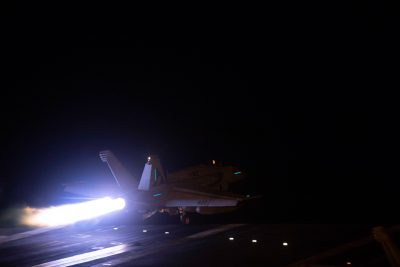US-UK Strike on Yemen’s Houthis ‘Blatant Armed Aggression’, Russian Envoy Tells UN
Washington and London argue strikes on Iran-backed group were consistent with international law

All Global Research articles can be read in 51 languages by activating the Translate Website button below the author’s name (only available in desktop version).
To receive Global Research’s Daily Newsletter (selected articles), click here.
Click the share button above to email/forward this article to your friends and colleagues. Follow us on Instagram and Twitter and subscribe to our Telegram Channel. Feel free to repost and share widely Global Research articles.
New Year Donation Drive: Global Research Is Committed to the “Unspoken Truth”
***
Russia’s top UN envoy called on Friday the joint US-UK strikes on Yemen’s Houthis a “blatant armed aggression against another country” that was in breach of the UN Charter.
“These states all carried out a mass strike on Yemeni territory,” Vasily Nebenzya told the UN Security Council.
“I’m not talking about an attack on some group within the country, but an attack on the people of the country on the whole. Aircraft were used, warships and submarines.”
Mr Nebenzya said the strikes on Houthi targets in Yemen “blatantly” violated Article 2 of the UN Charter.
“All of these pseudo-legal justifications of the White House don’t stand up to any criticism,” he added, saying that the right to self-defence does not apply to ensuring the freedom of shipping.
“Our American colleagues know this fact very well.”
Both the US and Britain defended the military strike as consistent with international law.
The strikes launched overnight were “to disrupt and degrade the Houthis’ ability to continue the reckless attacks against vessels and commercial shipping”, US ambassador to the UN Linda Thomas-Greenfield told council members.
“And they were taken only after none military options proved inadequate to address the threat. Still, any strike of this nature is a decision the United States does not take lightly,” she stressed.
With more than 2,000 vessels forced by Houthi attacks to divert from the Red Sea, the US envoy pointed out that no country on the UN Security Council is immune from the effects of these attacks.
“Not even Russia. No one. Whether your ship flies an American flag or the flag of another nation, whether you voted for this week’s resolution or you abstained from it … All of our ships are vulnerable.”
Ms Thomas-Greenfield also underscored Iran’s involvement in aiding Houthi rebels in Yemen. Without Iranian support, she said, the Houthis would face significant challenges in effectively tracking and attacking commercial vessels in the Red Sea and Gulf of Aden.
UK ambassador Barbara Woodward said Thursday’s operation took particular care to minimise risks to civilians and “limited, necessary and proportionate action in self-defence”.
Khaled Khiari, assistant secretary general for the Middle East, told the 15-member Security Council:
“We are witnessing the cycle of violence that risks grave political security, economic and humanitarian repercussions in Yemen and the region.”
“These developments in the Red Sea and the risk of exacerbating regional tensions are alarming.”
Earlier, UN Secretary General Antonio Guterres called on all parties involved not to further escalate the situation in the interest of peace and stability in the Red Sea and the wider region.
The situation in the Red Sea has become untenable, said Ms Thomas-Greenfield.
“Every single country has been affected by these attacks. So de-escalation needs to happen,” she said.
“It needs to happen from the Houthis who are putting all of our shipping lines in jeopardy.”
*
Note to readers: Please click the share button above. Follow us on Instagram and Twitter and subscribe to our Telegram Channel. Feel free to repost and share widely Global Research articles.
Featured image: On Jan. 11 at 2:30 a.m. (Sanaa time), U.S. Central Command forces, in coordination with the United Kingdom, and support from Australia, Canada, the Netherlands, and Bahrain conducted joint strikes on Houthi targets to degrade their capability to continue their illegal and reckless attacks on U.S. and international vessels and commercial shipping in the Red Sea. Image from CENTCOM/X

